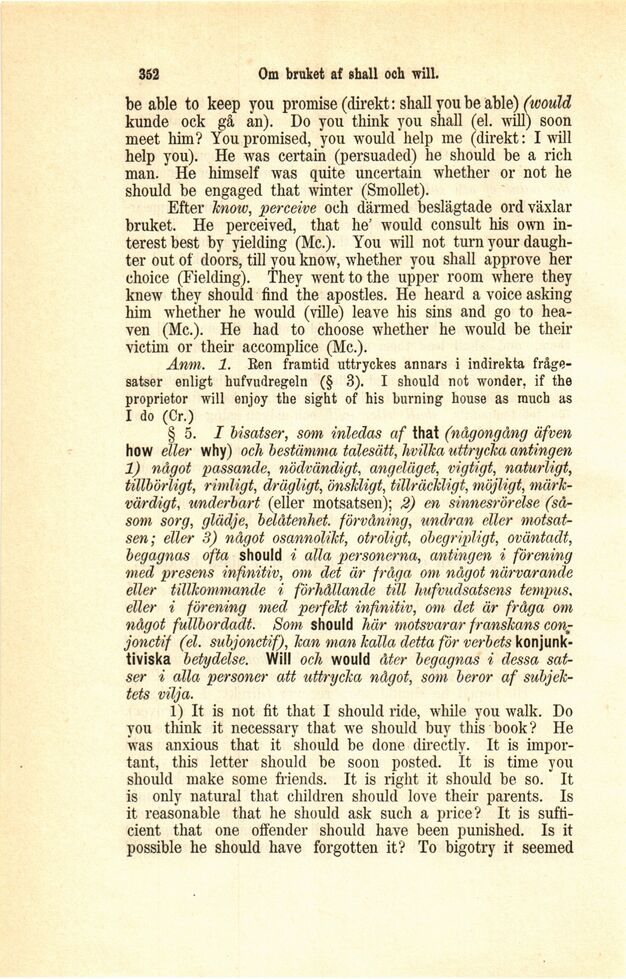
Full resolution (JPEG) - On this page / på denna sida - Häfte 10 - Om bruket af de engelska hjälpverben shall och will (G. S. Löwenhielm)

<< prev. page << föreg. sida << >> nästa sida >> next page >>
Below is the raw OCR text
from the above scanned image.
Do you see an error? Proofread the page now!
Här nedan syns maskintolkade texten från faksimilbilden ovan.
Ser du något fel? Korrekturläs sidan nu!
This page has never been proofread. / Denna sida har aldrig korrekturlästs.
352
Om bruket af b hall och will. 352
be able to keep you promise (direkt: shall yoube able) (would
kunde ock gå an). Do you think you shall (el. will) soon
meet him? Youpromised, you would help me (direkt: I will
help you). He was certain (persuaded) he should be a rich
man. He himself was quite uncertain whether or not he
should be engaged that winter (Smollet).
Efter know, perceive och därmed beslägtade ord växlar
bruket. He perceived, that he’ would consult his own
in-terestbest by yielding (Mc.). You will not turn your
daugh-ter out of doors, till you know, whether you shall approve her
choice (Fielding). They wenttothe upper room where they
knew they should find "the apostles. He heard a voice asking
him whether he would (ville) leave his sins and go to
hea-ven (Mc.). He had to choose whether he would be their
victim or their accomplice (Mc.).
Anm. 1. Ren framtid uttryckes annars i indirekta
frågesatser enligt hufvudregeln (§ 3). I should not wonder. if the
proprietor will enjoy the sight of his burning house as rauch as
I do (Cr.)
§ 5. I bisatser, som inledas af that (någongång äfven
how eller why) och bestämma talesätt, hvilka uttrycka antingen
1) något passande, nödvändigt, angeläget, vigtigt, naturligt,
tillbörligt, rimligt, drägligt, önskligt, tillräckligt, möjligt,
märkvärdigt, underbart (eller motsatsen); 2) en sinnesrörelse
(såsom sorg, glädje, belåtenhet, förvåning, undran eller
motsatsen; eller 3) något osannolikt, otroligt, obegripligt, oväntadt,
begagnas ofta should i alla personerna, antingen i förening
med presens infinitiv, om det är fråga om något närvarande
eller tillkommande i förhållande till hufvudsatsens tempus,
eller i förening med perfekt infinitiv, om det är fråga om
något fullbordadt. Som should här motsvarar franskans
con-jonctif (el. subjonctif), kan man kalla detta för verbets
konjunk-tiviska betydelse. Will och would åter begagnas i dessa
satser i alla personer att uttrycka något, som beror af
subjektets vilja.
1) It is not fit that I should ride, while you walk. Do
you think it necessary that we should buy this book ? He
was anxious that it should be done directly. It is
impor-tant, this letter should be soon posted. It is time you
should make some friends. It is right it should be so." It
is only natural that children should love their parents. Is
it reasonable that he should ask such a price? It is
sufti-cient that one offender should liave been punished. Is it
possible he should have forgotten it? To bigotry it seemed
<< prev. page << föreg. sida << >> nästa sida >> next page >>